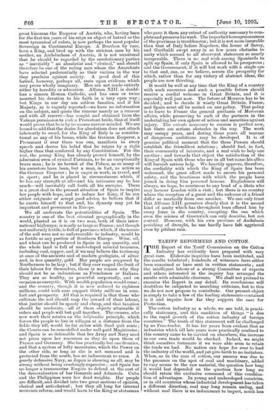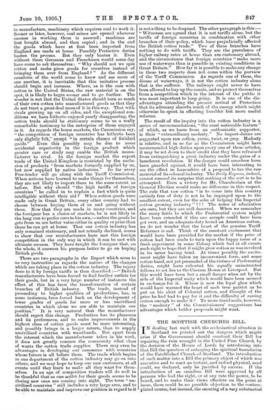TARIFF REFORMERS AND COTTON.
The cotton industry as a whole, we are told, is practi- cally stationary, and this condition of things "is due to the rapid growth of the cotton industry of foreign countries. The truth of this statement will be challenged by no Free-trader. It has for years been evident that as industries which till late years were practically confined to this country came to be carried on elsewhere, the increase in our own trade would be checked. Indeed, we might think ourselves fortunate if we were able even to retain the trade we had. No nation can hope for ever to lead. the industry of the world, and yet give birth to no imitators. When, as in the case of cotton, our success was due to the presence on the spot of coal and machinery, added to easy access to the raw material, the question how long it would last depended on the question how long we should retain the exclusive command of this combina- tion of advantages. In young and undeveloped countries, or in old countries whose industrial development has taken a different direction,, coal may long remain nndug, and. without coal there is no inducement to import, much less to manufacture, machinery which requires coal to work it. Sooner or later, however, coal mines are opened wherever success in working them is assured; machines are first bought abroad, and then copied ; and in the end the goods which have at first been imported from England are made at home. Possibly Protective duties hasten the process. But they only hasten it. Even without them Germans and Frenchmen would some day have come to ask themselves : "Why should not we spin cotton and make piece goods for ourselves instead of bringing them over from England ? " As the different countries of the world come to know and see more of one another, it is inevitable that this imitative process should begin and increase. Where, as is the case with cotton in the United States, the raw material is on the spot, it is likely to begin sooner and to go further. The wonder is not that the United States should turn so much of their own cotton into manufactured goods as that they do not treat a great deal more of it in this way. That with rivals growing up on all sides, and the exceptional con- ditions we have hitherto enjoyed yearly disappearing, the cotton trade should be stationary seems to us a really remarkable testimony to the enterprise of those engaged in it. As regards the home markets, the Commission say, "the competition of foreign countries has hitherto been only slightly felt," except "in certain classes of finished goods." Even this possibly may be due to some accidental superiority in the foreign product which greater care or study may enable the British manu- facturer to rival. In the foreign market the export trade of the United Kingdom is restricted by the exclu- sion of products "from markets formerly supplied by us, but now supplied by native industries.' So far every Free-trader will go along with the Tariff Commission. When nations have learned to make things for themselves, they are not likely to import them to the same extent as before. But why should "the high tariffs of foreign countries" be called in to explain a fact which is quite intelligible without their aid ? When cotton goods were made only in Great Britain, every other country had to choose between buying them of us and going without them. Now that they are made in many countries, and the foreigner has a choice of markets, he is not likely in the long run to prefer ours to his own,—unless the goods he gets from us are better value either in quality or price than those he can get at home. That our cotton industry has only remained stationary, and not actually declined, seems to show that our manufacturers have met this foreign competition in the only way in which it can be met with ultimate success. They have taught the foreigner that, on the whole, it answers his purpose better to go on buying British goods.
There are two paragraphs in the Report which seem to us very instructive as regards the nature of the changes which are taking place in the cotton industry. The injury done to it by foreign tariffs is thus described :—" British manufacturers have been forced to find further outlets for their goods, but in a very large number of instances the effect of this has been the transformation of certain branches of British industry. The ,trade, instead of proceeding to higher qualities of productions, has, in some instances, been forced back on the development of lower grades of goods for more or less uncivilised countries in which alone we are able to maintain our position." It is very natural that the manufacturer should regret this change. Production has its pleasures and its preferences, and to make improvements in the highest class of cotton goods must be more interesting, and possibly brings in a larger return, than to supply uncivilised countries with waistbands. But apart from the interest which the manufacturer takes in his work, it does not greatly concern the community what class of wants the cotton trade supplies. There may even be advantages in developing our commerce with countries whose future is all before them. The trade which begins in one department of the cotton industry may go on into others, and we may hope to keep our new customers, at all events until they learn to make all they want for them- selves. In an age of competition traders will do well to be thankful that as one eutlet for their goods seems to be closing new ones are coming into sight. The term "un- civilised countries" still includes a very large area, and to be able to maintain and improve our position in regard to it is not a thing to be despised. The other paragraph is this:— " Witnesses are agreed that it is not tariffs alone, but the tariffs of foreign countries in combination with other branches of their policy, which have prejudicially affected the British cotton trade." Two of these branches have' nothing to do with tariffs. They are the prevalence of higher railway rates at home than are customary abroad,' and the circumstance that foreign countries "make more use of waterways than is possible in existing conditions in Great Britain." How far it is possible to make any change in these two respects does not come within the purview of the Tariff Commission. As regards one of them, the disuse of waterways, it is not the cotton industry alone that is the sufferer. The railways ought never to have been allowed to buy up the canals, and so protect themselves from a competition which in the interest of the public it was most important to keep going. It is one of the dis- advantages attending tho present revival of Protection that its advocacy absorbs much of the energy which might otherwise be spent in effecting humbler but more useful reforms.
The result of the inquiry into the cotton industry is a series of recommendations, "the most noticeable feature" of which, as we learn from an enthusiastic supporter, is their "extraordinary modesty." No import-duties are suggested upon raw cotton, yarns, twist, or grey. Modesty is relative, and. in so far as the Commission might have recommended high duties upon every one of these articles, it may be set down to their credit that they have refrained from extinguishing a great industry under the guise of a beneficent revolution. If the danger could somehow have been guarded against, it would have been interesting to see the effect in Lancashire of a proposal to tax the raw material of its colossal industry. The Daily Express, indeed, cannot conceal its surprise that nothing of the sort is to be attempted. Even a victory for Mr. Chamberlain at the General Election would make no difference in this respect. The rule that raw cotton "is to come into this country entirely free of duty is not to be impinged upon to the smallest extent, even for the sake of helping the Imperial cotton growing industry" ! ! ! The notes of admiration are ours, but they are well deserved. When we remember the many fields to which the Preferential system might have been extended if this one scruple could have been got over, and an adequate duty levied on American cotton, we do not wonder that the heart of the genuine Tariff Reformer is sad. Think of the constant excitement that would have been provided for the market if the price of cotton had been made to turn upon the happy issue of a fresh experiment in some Colony which had at all events such right to hope that it might grow cotton as was involved in its never having tried. At times possibly the excite- ment might have taken an inconvenient form, and some cotton hand, not yet persuaded of the virtues of Preferential duties, might have exhorted his equally uninstructed fellows to set fire to the Custom House at Liverpool. But this would have been but a small danger when set by the side of the Imperial unity which would have been secured in exchange for it. Where is now the loyal glow which would have warmed the heart of each true patriot as he put on his shirt of Colonial cotton, and thought of the price he had had to pay for it and the difficulty of raising cotton enough to make it ? To more timid souls, however, the " modesty " of the Commissioners' suggestions has advantages which bolder proposals might want.







































 Previous page
Previous page